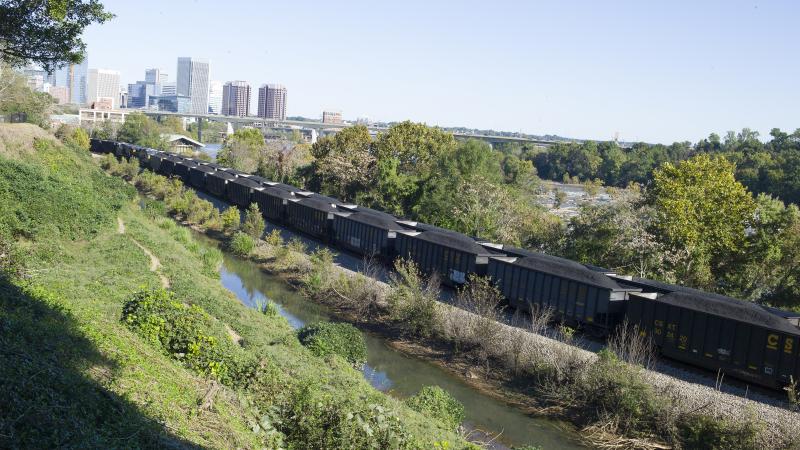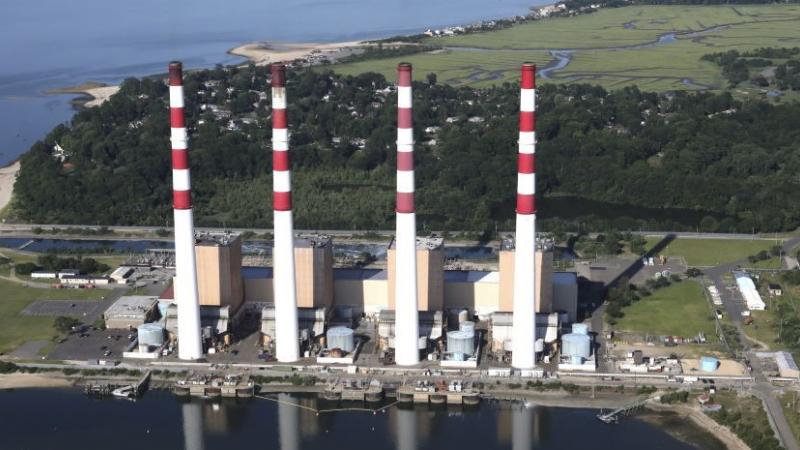Climate conservatives seek ‘all of the above,’ but some GOP'ers see it as hostile to fossil fuels
“Through innovation, we can continue to reduce our emissions without sacrificing reliability or affordability," Rep. Buddy Carter, R-Ga., vice chair of the Conservative Climate Caucus, said.
Wyoming’s Republican Gov. Mark Gordon in October gave a talk at Harvard titled “Decarbonizing The West.” In the talk, Gordon said that Wyoming, “needs to urgently address climate change by going carbon negative.” He expressed support for carbon capture technologies and an “all of the above” energy strategy. Gordon made the same points to a national audience a couple months later on CBS' “60 Minutes.”
State GOP gives Gordon a "No Confidence" vote
The Wyoming Republican Party gave the governor a vote of “no confidence.” Cowboy State Daily reports that the controversy over Gordon’s statements continued as the Wyoming legislature headed into session.
Wyoming produces 41% of the coal consumed in the United States, and is the eighth largest producer of crude oil. With its economy heavily rooted in traditional extractive industries like coal, oil and gas, Gordon’s comments drew a fierce rebuke from conservative state lawmakers.
Polls show that most Republicans place less importance on climate change than do Democrats, and conservatives have been much more friendly toward fossil fuel development.
The distinction between hardcore climate activists on the left and moderate conservatives like Gordon who believe that climate change is a problem that needs to be addressed – and in Gordon’s case addressed with urgency — is that the conservatives do not argue that fossil fuels should be eliminated at any cost and as soon as possible. The importance of affordable, reliable energy, they argue instead, needs to be balanced with the risk of global warming.
“Through innovation, we can continue to reduce our emissions without sacrificing reliability or affordability. Our energy grid is only as good as people’s ability to access it, and we must have a diverse energy portfolio that works even when the wind doesn’t blow, or the sun doesn’t shine,” Rep. Buddy Carter, R-Ga. told Just The News.
Carter is vice chair of the Conservative Climate Caucus, which takes the position that “reducing emissions is the goal, not reducing energy choices.” It aims to educate House Republicans on climate change and possible policies that might address it.
Divided party
In the energy state of Wyoming, many saw Gordon’s remarks as an attack on the fossil fuel industry, which is a primary driver of the state’s economy.
Wyoming Sen. Cheri Steinmetz, a Republican who chairs the state’s agriculture committee, held a hearing on Friday concerning the impacts of Gordon’s proposed “net zero” and “carbon negative” policies.
“Policy decisions related to climate change are important and must be transparent to the public, scrutinized and debated by the legislative body, rather than be decided solely by the chief executive,” Steinmetz said in a statement emailed to Just The News.
The hearing featured a presentation from members of the CO2 Coalition, an organization that argues that increased carbon dioxide in the atmosphere is not on the whole particularly problematic and certainly not an emergency.
The coalition’s members include Dr. John Clauser, who won the Nobel Prize in physics in 2022, Dr. Patrick Moore, co-founder of Greenpeace, and Dr. William Happer, professor emeritus of the Department of Physics at Princeton University. Prior to the hearing, members of the CO2 Coalition toured Wyoming coal mines. They met with state officials and energy experts at the University of Wyoming.
Gregory Wrightstone, executive director of the CO2 Coalition, told Just The News that their visit to the Cowboy State is entirely a result of Gordon voicing support for net-zero policies.
“It's both unattainable and actually harmful to the ecosystems and the people of Wyoming,” Wrightstone said.
The coalition produced a report, which was emailed to Just The News, disputing claims that global warming will harm the state’s agricultural industry. The report concludes that increased temperatures will mean longer growing seasons, and the “greening” effect of carbon dioxide will produce a net benefit to agriculture, which is Wyoming’s third largest industry after tourism.
Wrightstone said the group is producing these reports for dozens of states to challenge the belief that climate change is an urgent problem and that carbon dioxide is driving increases in temperatures.
“We want to have true science. We want to promote the scientific method. We want to promote critical thinking. And the scientific method is being avoided by the climate crisis crowd that are promoting this false notion of an emergency,” Wrightstone said.
False choices
Luke Bolar, chief external affairs officer for ClearPath, which supports free-market approaches to addressing carbon emissions, told Just The News that the debate on these issues frames it as a set of false choices between renewables and fossil fuels.
“What we say is that climate change is happening and human industrial activity is contributing. And we should be focused on solutions that are market based, putting innovation over regulation and making energy reliable, affordable and clean,” Bolar said.
When it comes to renewables versus fossil fuels, Bolar said that both are needed. Putting the economy over the environment or vice-versa, he said, isn’t a good way to think about energy. “We think you can grow new American industries, strengthen existing ones and reduce emissions. That's just looking further than what oil and gas majors are doing. And they are creating new business lines, which will create new technologies, which will create new economic opportunities,” Bolar added.
Among those actions the gas majors are taking, he said, are investments in carbon capture and the development of a hydrogen industry. Bolar said that ClearPath advocates for market decisions on technologies that work and are reliable and affordable.
“We think that if a technology is reliable and affordable, markets will like the clean option,” he said.
To illustrate how a free-market model works along with government in the scaling of technologies, Bolar pointed to the Shale Revolution. U.S. producers developed hydraulic fracturing technologies that made it possible to release oil and gas from tight rock and sand formations.
The revolution unleashed a tremendous amount of oil and gas, resulting in the U.S. becoming a top petroleum producer, even surpassing OPEC at one time. Shale oil contributes to the production of crude oil as well as natural gas. The U.S. was the world’s top crude oil producer from 2018 to 2022, according to the U.S. Energy Information Administration.
The development began in the 1980s and 1990s with innovations in the private sector, and the Department of Energy invested some research and development, including tax incentives.
“Over the course of a decade, that industry scaled up massively, and we say it was like a 10 to one return on investment,” Bolar said.
Voter concerns
Urging voters to support policies that reduce emissions might be tough in the coming election season. Voters, according to an American Energy Alliance poll, are primarily concerned with the state of the economy and inflation. Among Republicans, climate change barely ranked as a concern.
Rep. John Curtis, who currently chairs the Conservative Climate Caucus, is pursuing the seat of Sen. Mitt Romney, R-Utah. Romney, who is a member of the Bipartisan Senate Climate Solutions Caucus, announced last year he wasn’t going to run for another term.
Should former President Donald Trump win the Republican nomination, campaign rhetoric among many Republicans will likely be critical of climate change.
In his bid for Senate, Curtis is standing by his position on energy and climate change. “The fact I have leaned into an issue that is not typically traditional [among Republicans] is helpful to me,” Curtis told Politico in January.
Curtis told E&E News Friday that a Trump victory in the presidency won’t deter his direction, either. “If there are headwinds, we’ll keep pushing forward,” he told E&E News.
Carter said he doesn’t believe that the conservative climate position will alienate economy-concerned voters this election. It can be a selling point, he said.
“An all-of-the-above energy strategy empowers consumers to decide when and how to reduce their emissions without pushing one-size-fits all mandates on already cash-strapped taxpayers. With inflation continuing to burn a hole in people’s pockets, now is the time to cut red tape and unleash American energy dominance, leading to lower energy prices for all,” Carter said.
The Facts Inside Our Reporter's Notebook
Links
- Decarbonizing The West
- same points to a national audience
- produces 41% of the coal consumed in the United States
- eighth largest producer of crude oil
- governor a vote of "no confidence."
- reports that the controversy over Gordon's statements continues this week
- most Republicans place less importance on climate change
- friendly toward fossil fuel development
- Conservative Climate Caucus
- primary driver of the state's economy
- CO2 Coalition
- John Clauser
- Patrick Moore
- William Happer
- third largest industry after tourism and minerals development
- ClearPath
- Shale Revolution
- according to an American Energy Alliance poll
- according to the U.S. Energy Information Administration.
- Bipartisan Senate Climate Solutions Caucus
- Curtis told Politico in January
- told E&E News Friday
















